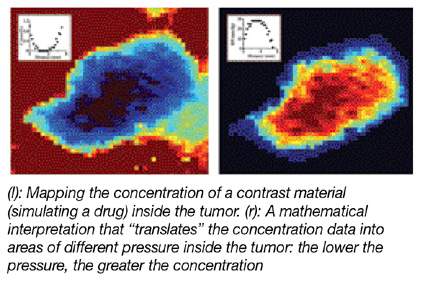Chemotherapy drugs given intravenously are the mainstay of the fight against cancer. But while these drugs sometimes effect a complete cure, other times they can be almost ineffective. A team headed by Prof. Hadassa Degani of the Biological Regulation Department has come up with a non-invasive method for predicting possible problems. The findings of their studies on animals, which appeared in Cancer Research, may in the future influence treatment regimes for millions of cancer patients.
Intravenous infusions rely on the bloodstream to carry drugs to where they are needed. Normally, a material such as a chemotherapy drug crosses into a tissue on the principle of concentration equalization – the material diffuses from an area of high concentration to one of low concentration until the concentrations become equal all around. In some cancers, however, even though the material “wants” to spread out evenly, fluids inside the tumor may be exerting pressure, preventing the drug from entering.
The method the Institute scientists developed can measure, with a non-invasive magnetic resonance imaging scan, whether the fluid pressure in the cancerous tissue is at a level that could render chemotherapy ineffective. Degani says that, ideally, the fluid pressure inside the tumor tissue would be checked before a patient begins chemotherapy. If the pressure were discovered to be high, it might be possible to reduce it by various means. The method, if it proves successful in clinical trials, might have the potential to significantly increase the success rate of chemotherapy.
Prof. Hadassa Degani’s research is supported by the M.D. Moross Institute for Cancer Research; the Willner Family Center for Vascular Biology; the Washington Square Health Foundation; Lord David Alliance, CBE, UK; Dr. and Mrs. Leslie Bernstein, Sacramento, CA; Ms. Lynne Mochon and the estate of Edith Degani, New York, NY; Ms. Sophy Goldberg, Israel; and the estate of Julie Osler, New York, NY. Prof. Degani is the incumbent of the Fred and Andrea Fallek Professorial Chair in Breast Cancer Research.
